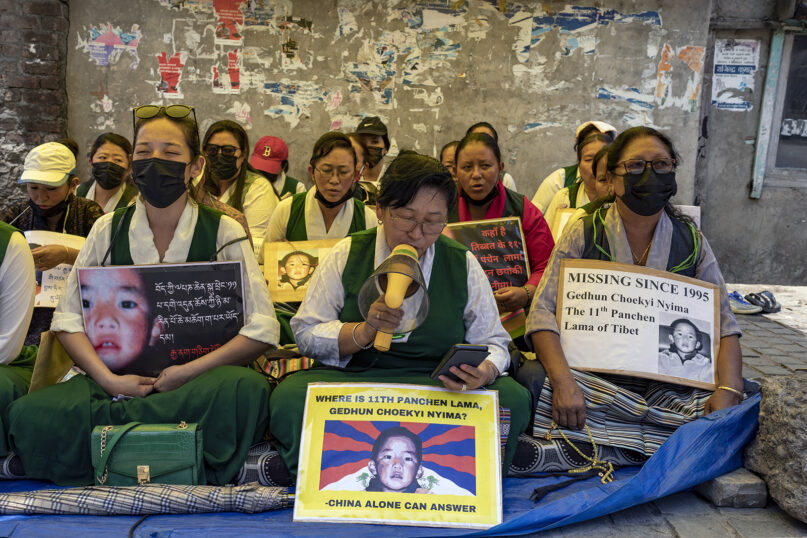(RNS) — Fresh off the heels of Pope Leo XIV’s elevation, another succession drama is looming with profound geopolitical implications: locating, recognizing and confirming the reincarnation of the Dalai Lama.
This process may well become a critical flashpoint in the Chinese Communist Party’s ongoing effort to control Tibet, and potentially any religious institution it sees as challenging its authority.
The 89-year-old Dalai Lama — who turns 90 on Sunday (July 6) and has indicated he will provide further succession details then — recently announced in his book “Voice for the Voiceless” that his successor will be born in the “free world” outside China. That’s a direct challenge to Beijing’s long-standing insistence that it alone has the authority to identify his reincarnation. This is not merely a theological dispute but a contest for religious and cultural legitimacy that stretches back centuries.
Beijing’s determination to neutralize independent religious authorities stems from viewing them as threats to sovereignty — what it condemns as foreign interference. That means any religious institution that could challenge its narrative or become a rallying point for resistance must be controlled. As the new pope will discover, Beijing’s relationship with the Vatican remains fraught with struggles for control.
For the Tibetan people and adherents of Tibetan Buddhism worldwide, however, the selection of the next Dalai Lama is not about political power, but about preserving authentic and autonomous religious, cultural and linguistic traditions free from state manipulation.
The Dalai Lama speaks with remarkable candor about his own reincarnation. When Mike, one of this column’s authors, last met with him in April 2022, the conversation turned to these succession questions. The Dalai Lama’s clarity was striking: The future of Tibetan Buddhism must remain in the hands of its practitioners, not government officials in Beijing.
When asked what happens after he passes, he gave a response both philosophical and practical. He emphasized that China’s deliberate efforts to hijack Buddhism represent not just a religious concern, but a fundamental challenge to cultural freedom. These conversations underscored that what might appear to outsiders as abstract theological matters are in fact central to the struggle between authoritarianism and religious and cultural autonomy.

Members of the Tibetan Women’s Association participate in a protest demanding the release of Gedhun Choekyi Nyima, the 11th Panchen Lama, in Dharamshala, India, May 17, 2022. The boy lama, who is the second-highest religious leader in Tibetan Buddhism, went missing shortly after his recognition by the Dalai Lama in 1995 and has not been seen since. (AP Photo/Ashwini Bhatia)
In pursuit of power and control, the CCP has established government-approved Buddhist institutions while suppressing those loyal to the exiled Dalai Lama. In 1995, after the Dalai Lama recognized 6-year-old Gedhun Choekyi Nyima as the 11th Panchen Lama — the second-most-important figure in Tibetan Buddhism — Chinese authorities abducted the child and his family. For nearly three decades, China has kept the legitimate Panchen Lama hidden from the world, refusing to disclose his whereabouts or condition despite repeated international inquiries.
Meanwhile, Beijing installed its own candidate, Gyaltsen Norbu, and has spent years promoting this state-approved figure while systematically working to legitimize him in Buddhist institutions under the state’s control. The Panchen Lama traditionally plays a key role in identifying the Dalai Lama’s reincarnation — making the long-term suppression of the legitimate choice a calculated strategic move in the succession battle now gathering momentum. History has repeatedly shown that when governments co-opt religious succession for political gain — from medieval European monarchies to Soviet control of Orthodox hierarchies — both spiritual authenticity and institutional credibility inevitably suffer.
This is not just an issue for Tibetans and for China: The Dalai Lama’s declaration of his intended reincarnation outside of China presents democratic nations with a choice that can no longer be deferred. Will they recognize his chosen successor, potentially born in India or another “free country,” or acquiesce to China’s candidate to avoid diplomatic friction? India, which hosts the Tibetan government-in-exile, faces particular pressure as it balances relations with its powerful neighbor against its democratic values and strategic interests.
Western democracies have often subordinated religious freedom concerns to economic interests with China. Muted international response to Tibet’s religious and cultural suppression over the years reflects this reluctance to confront Beijing directly. But as China grows more assertive in extending its authoritarianism beyond its borders, this succession question is a test of whether democratic nations still believe some principles transcend pragmatism.
The passing of religious leaders like Pope Francis reminds us that institutional continuity depends on legitimate succession. For Catholics, this means a conclave free from outside interference. For Tibetan Buddhists, it means the right to follow traditions undistorted by political manipulation. All religious communities deserve succession processes that honor their tradition and that are directed by the community of the faithful themselves, rather than those that serve a particular government’s political or geostrategic agenda.
As Pope Leo steps onto the world stage, the international community has an opportunity to reflect on what a religious succession process free of external interference and reflecting the will of the community of faith looks like. And as democracies consider their response to the Dalai Lama’s succession process, they might ask whether accommodating religious suppression today will invite greater demands tomorrow. The answer will reveal much about whether we still believe freedom of conscience remains a universal right or has become merely a negotiable interest.
(Mike Kuiken is a distinguished visiting fellow at the Hoover Institution at Stanford University. Randall Schriver is chairman of the Institute for Indo-Pacific Security, formerly Project 2049. The views expressed in this commentary do not necessarily reflect those of Religion News Service.)







